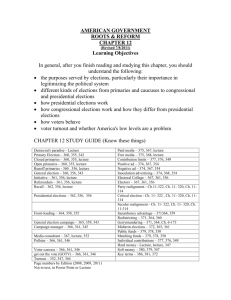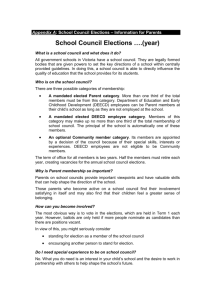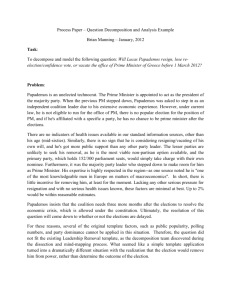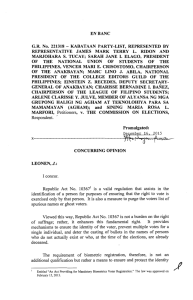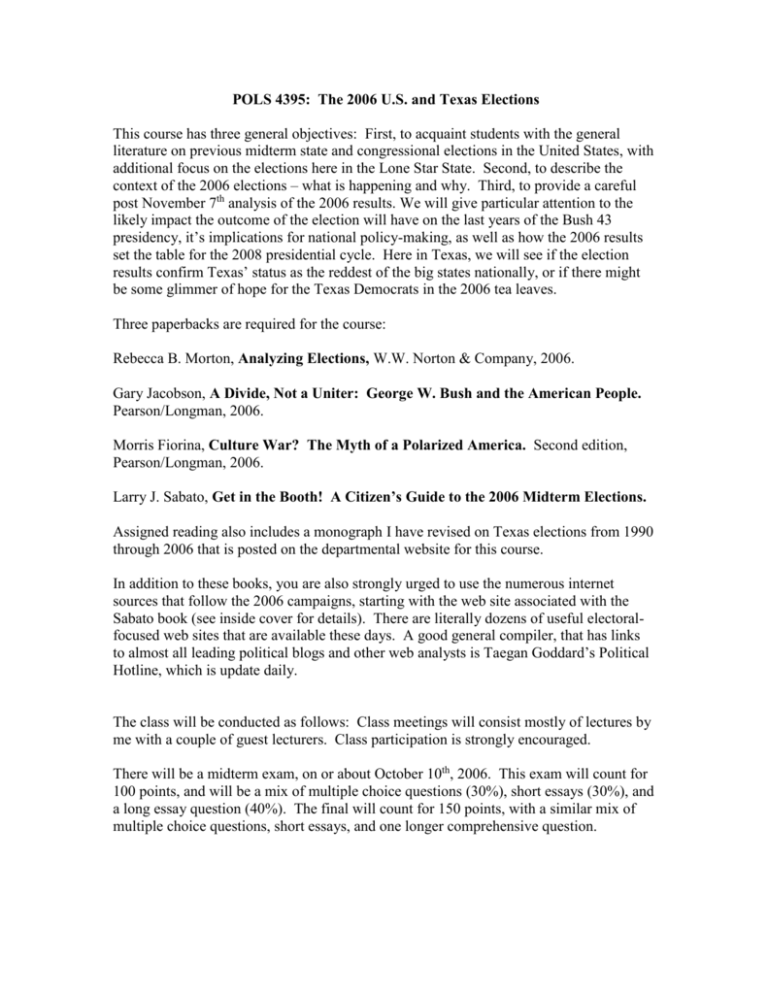
POLS 4395: The 2006 U.S. and Texas Elections
This course has three general objectives: First, to acquaint students with the general
literature on previous midterm state and congressional elections in the United States, with
additional focus on the elections here in the Lone Star State. Second, to describe the
context of the 2006 elections – what is happening and why. Third, to provide a careful
post November 7th analysis of the 2006 results. We will give particular attention to the
likely impact the outcome of the election will have on the last years of the Bush 43
presidency, it’s implications for national policy-making, as well as how the 2006 results
set the table for the 2008 presidential cycle. Here in Texas, we will see if the election
results confirm Texas’ status as the reddest of the big states nationally, or if there might
be some glimmer of hope for the Texas Democrats in the 2006 tea leaves.
Three paperbacks are required for the course:
Rebecca B. Morton, Analyzing Elections, W.W. Norton & Company, 2006.
Gary Jacobson, A Divide, Not a Uniter: George W. Bush and the American People.
Pearson/Longman, 2006.
Morris Fiorina, Culture War? The Myth of a Polarized America. Second edition,
Pearson/Longman, 2006.
Larry J. Sabato, Get in the Booth! A Citizen’s Guide to the 2006 Midterm Elections.
Assigned reading also includes a monograph I have revised on Texas elections from 1990
through 2006 that is posted on the departmental website for this course.
In addition to these books, you are also strongly urged to use the numerous internet
sources that follow the 2006 campaigns, starting with the web site associated with the
Sabato book (see inside cover for details). There are literally dozens of useful electoralfocused web sites that are available these days. A good general compiler, that has links
to almost all leading political blogs and other web analysts is Taegan Goddard’s Political
Hotline, which is update daily.
The class will be conducted as follows: Class meetings will consist mostly of lectures by
me with a couple of guest lecturers. Class participation is strongly encouraged.
There will be a midterm exam, on or about October 10th, 2006. This exam will count for
100 points, and will be a mix of multiple choice questions (30%), short essays (30%), and
a long essay question (40%). The final will count for 150 points, with a similar mix of
multiple choice questions, short essays, and one longer comprehensive question.
One short research report is required, worth 50 points. This project entails completing a
is a 1,000- 1,000 word political autobiography that defines your general political profile
(partisan identity, if any; ideology, issues that interest you, with an explanation of how
you came to hold these views). A more complete outline will be made available the
second week of class. This paper will be due September 7th.
One long research paper is required, worth a total of 150 points. The paper should be a
minimum of 4000 words, in which you analyze a competitive 2006 election in Texas or
another state. Good contests to consider are the U.S. Senate races in the following
states:
Rhode Island (Chaffee R) seat
Pennsylvania (Santorum (R) seat
Ohio (Dewine R) seat
Minnesota (Open seat)
New Jersey (Menendez D) seat
Virginia (Allen R) seat
Missouri (Talent R) seat
Montana (Burns R) seat
Tennesee (Open seat)
Washington (Cantwell D) seat
There are also spirited governor elections in:
Pennsylvania
Ohio
Iowa
Michigan
Florida
Wisconsin
California
And, we have a number of interesting contests in Texas, starting with a four-way
governor election, a U.S. senate contest, a several hard-fought local races.
The paper should set the context of the 2006 race by reviewing recent elections in
the state or district you are focusing, with especial emphasis on what happened in the
state or district in the 2000, 2002, and 2004 elections. Background sources should
include America Votes and the state write-ups in The Almanac of American Politics
and Politics in America. For the actual analysis of the campaign you are following,
most of your research will be web-based from ongoing media reports, blogs, newspaper
stories, etc.. A minimum of 10 independent sources is required for your paper.
Next, analyze the 2006 campaign you have chosen to focus on. Assess the quality of the
major candidates. What are the issues that are relevant in the race? Is the election mostly
about national factors (the Bush presidency, gas prices, Iraq), or is it mostly about local
factors such as the performance of the incumbent, amount of money spent, local issues,
etc.. A preliminary paper covering these subjects of 1,500 words is due on Thursday
November 2nd (that is the “Day of the Dead” for those of you familiar with Latin culture).
This early draft must include your prediction of how the election the following Tuesday
will turn out, and a brief account for why you think things will turn out as they do in
November 7th. You will not be graded on your prediction, but you will need to
incorporate it into your final paper, and explain why you got things right, or wrong, or
some of both. Most accurate prediction wins a $25 prize from your instructor.
The final paper should roughly follow the following outline:
I.
Context of the election. Past relevant political history, demography of the
state or district. Approximately 500 words.
II.
Assessing the major candidates. What are their strengths, weaknesses? How
do they match up against one another? Another 500 words or so.
III.
Assess the issue context. What are voters reacting to? Iraq, terrorism, the
economy, moral issues, character of the candidates? About 1,000 words.
IV.
Assess the quality of each campaign in terms of candidate performance,
raising money, overall strategy, message and tactics. Grade each campaign
(A to F), and explain your grade choice. About 1,000 words.
V.
What happened? Include as an appendix the results of the race with
breakdowns by county or (if a local race) by voting precinct. Then write up a
500-750 word explanation of why things went as they did. Make sure to
discuss turnout patterns in this section. Who got their voters to the polls and
who did not?
VI.
Finally, in a concluding section of 500 words or so, discuss the significance of
what happened in your race. What difference does the outcome make in terms
of party politics, public policy, and the impact on future elections.
This long research paper is due Thursday, November 30th.
Attendance will be taken using a sign-in roll that I’ll circulate in class. More than two
unexcused absences will result in a loss of 2 points per class. Absences will be excused
based on a written request with supporting documentation.
Garding: There are a total of 450 points possible in the class, 200 from the papers and
250 from the two exams. Final grades will be based on the following percentage of the
total points:
A…………. 91.5% and higher
A-………… 89.5 – 91.4
B+………… 87.0 – 89.4%
B…………. 81.5 – 86.9%
B-……………79.5 – 81.4%
C+…………. 77.0 – 79.4%
C…………… 71.5 – 76.9%
C-………….. 69.5 – 71.4%
D+…………. 67.0 – 69.4%
D…………… 61.5 – 66.9%
D-…………. 59.5 - 61.4%
The order of readings and exams -for the class is as follows:
I. Understanding American Elections: The Context of the 2006 Elections …
The general role of American elections – Chapter 1 in Morton.
Voters, Candidates, and Ideology – Morton Chapters 2-5, 9,10; Fiorina,
Chaps. 1-7.
Money and Media. Morton, Chapters 6 - 8.
Political Parties and Minority Voters. Morton, Chapters 14, 15.
Elections in Texas. Read the Murray paper.
Midterm Exam: About October 10, 2006. 100 points.
II. The 2006 Elections:
George W. Bush and the Six Year Itch. Read the Jacobson book.
Checking out the 2006 Election Lineup: Read the Sabato book and Chapters
8, 9 in Fiorina.
Analyzing the election results. No assigned reading.
III. Looking Ahead to 2008.
The Upcoming Presidential Cycle. Read Morton chapters 12, 13.
I.
How 2006 sets the stage for 2008. Morton, Chapter 16.
Elections and the Future of American Politics. Read Chapter 10 in Fiorina.
.
Final Exam: Date to Be Announced.
My office is in 404 PGH. My phone is 713-743-3909. Email address is
rmurray@uh.edu. (Note the initial – there are several Murrays at UH).
Office hours are 10-11:30TTH, and 1-2:30PM Wed.




